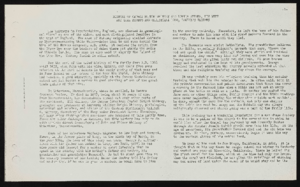Search the Special Collections and Archives Portal
Search Results

Transcript of interview with Jay Poster by Barbara Tabach, August 26, 2016
Date
Archival Collection
Description
Music brought Jay Poster to Las Vegas for a brief time in 1974. Jay wanted to pursue a musical career and his cousin was a professional musician with the Nat Brandwynne Orchestra at Caesars Palace. To Jay?s disappointment, within a few months his cousin Jack Poster left Las Vegas for a road tour. So Jay decided his best strategy was to return home to San Diego and his studies at San Diego State University. It would be over a decade later before Jay returned to Las Vegas to live and this time it became permanent. This time it was not for music. For beyond his musical talent, Jay had a gift for connecting with people of all of ages and walks of life. He was good at sales and his day job selling office furniture offered him the opportunity to transfer to Las Vegas in 1986. Within a few years, however, it was a recruiter for Palm Mortuaries who introduced Jay to his defining career moment and to Allen Brewster, a prominent Jewish leader and founder of King David Cemetery and Mortuary. It was 2001. Jay has been King David?s ever since and is the General Manager. In this interview, Jay describes his personal and spiritual growth through his career in funeral services and his respect for the Jewish traditions of burial and grieving. In addition, his passion for music has also soared and he talks about his participation in the Shabbatones at Congregation Ner Tamid and Desert Winds, a community based performance organization. He shares his love of traditional Jewish klezmer music and the Meshugginah Klezmorim.
Text

Transcript of interview with Sharon Walker by Barbara Tabach, October 8, 2014
Date
Archival Collection
Description
Sharon Walker is a real estate investor, retired stockbroker and former loan officer. She was born on December 8, 1949 in Toledo, Ohio, and moved to Las Vegas with her family in 1963, where they started Walker Furniture, a store which they later sold to the Alterwitz family. Sharon's father, Julius Walker, was also in the casino business, becoming an owner of the El Cortez Hotel and Casino with Jackie Gaughan. Her mother, Anne Walker was a founding member of the first local Hadassah, The Women?s Zionist Organization. Sharon continues the family tradition of being active in Hadassah as well as being a Board Member of Jewish Family Service Agency. In November 2014 she was an honoree of Hadassah Leadership. In this interview, Sharon describes her adolescence in Las Vegas and the differences in culture as compared to her childhood in Toledo, Ohio. She also recalls the Walker Furniture business, her father?s careers, and her uncles Ed ?E? Walker and Lou ?Paddock? Walker.
Text
Pearson Urban, Ruth, 1948-
Ruth Urban was born November 16, 1948 in Los Angeles, California. At the age of ten, she moved to Las Vegas, Nevada with her mother and older sister. Urban spent most of her childhood in the Huntridge area and was always involved with Temple Beth Sholom. After graduating from Las Vegas High School, Urban attended the University of Nevada, Las Vegas where she received a bachelor’s degree in social work, and later, a master’s degree in counseling.
Person
Mack, Joyce, 1925-2024
Joyce Mack was a community leader, volunteer, and philanthropist in Las Vegas, Nevada who supported UNLV since its founding. Born Joyce Rosenberg on August 17, 1925 in Los Angeles, California, she later attended the University of California, Los Angeles, where she met her husband Jerome D. "Jerry" Mack. The couple married in 1946 and moved to Las Vegas, Nevada in 1947.
Person

Transcript of interview with Jonathan Sparer by Stefani Evans and Claytee White, August 29, 2016
Date
Archival Collection
Description
Text

History of George Burton Whitney and Lovina Syphus, his wife and Luke Syphus and Christiana Long, Lovina's parents, undated Genealogical data sheet, John Mathieson Bunker and Mary Etta Syphus
Archival Collection
Description
From the Syphus-Bunker Papers (MS-00169). The folder contains documents about the history of George Burton Whitney and his wife, Lovina Syphus, and Luke Syphus and Christiana Long, Lovina's parents, and a genealogical data sheet for John Mathieson Bunker and Mary Etta Syphus.
Text
Rita Deanin Abbey Exhibition Catalogs
Identifier
Abstract
The Rita Deanin Abbey Exhibition Catalogs (1975-1991) are comprised primarily of exhibition catalogs featuring Abbey's art at various museums and international exhibitions including the Palm Springs Desert Museum, the University of New Mexico Art Museum, Biennale Internationale d’Email Laval, and the International Exhibition of Enamelling Art in Japan. The collection also contains invitations to Abbey's art shows at the University of Nevada, Las Vegas as well as a copy of Abbey's curriculum vitae. Also included are select issues of
Archival Collection

Mara Braun interview, September 9, 2019: transcript
Date
Archival Collection
Description
Interviewed by Barbara Tabach. Mara Braun, a native of Puerto Rico, has lived in Las Vegas since 1975. She is the owner/operator of a successful event and catering business. Mara married Abe Braun and raised their children in both Latinx and Jewish traditions.
Text

Transcript of interview with Mike and Susan Baller by Barbara Tabach, March 16, 2016
Date
Archival Collection
Description
In this interview, Mike and Susan Baller reflect upon their lives in Las Vegas, from growing up as teenagers amongst the tight-knit Jewish community, to mob influence on the city, and the impact of the city's growth. Mike shares stories about first arriving in Las Vegas to live, being a teenaged busboy at Binions Horseshoe to being related to Moe Dalitz -- in Michigan Mike drove a truck for the Dalitz dry cleaning business.
Text
